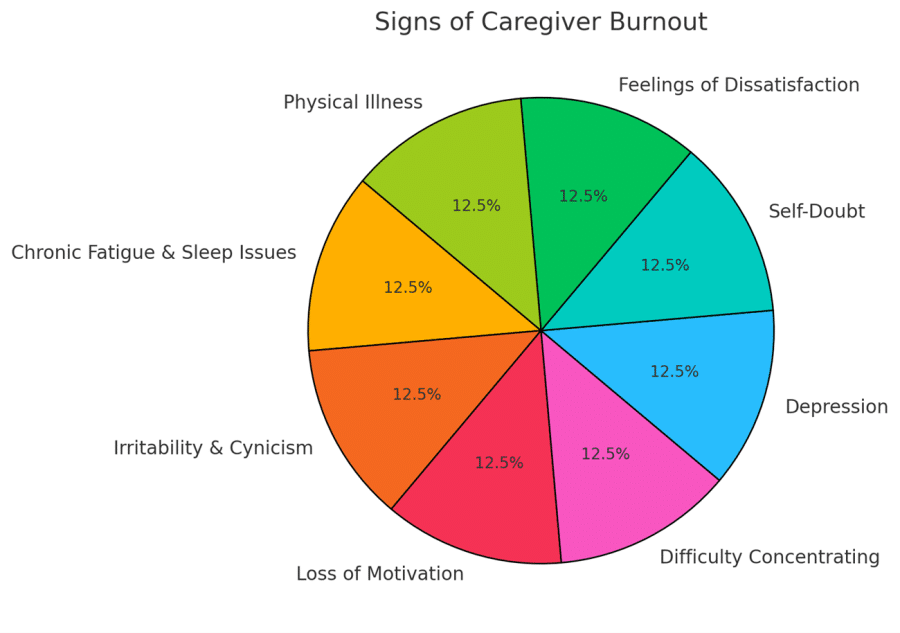Boundaries and Burnout: How Caregivers Can Protect Their Mental Health
Being a professional caregiver for seniors is one of the most meaningful jobs out there and one of the most emotionally and physically demanding. Caregivers often have deep compassion and a desire to help. Without clear and sustainable boundaries, however, that same empathy can lead to burnout.
Understanding Burnout in Caregiving
Burnout doesn’t happen overnight. It builds gradually — through long hours, emotional investment, and the ongoing pressure of supporting another person’s needs. Researchers define burnout as, “a psychological syndrome of emotional exhaustion, depersonalization and reduced personal fulfillment.”
Signs of caregiver burnout can include:
📉 Chronic Fatigue & Sleep Issues
Always tired, with trouble sleeping or oversleeping.
😠 Irritability & Cynicism
Increased frustration or a more negative outlook.
😞 Feelings of Dissatisfaction
You no longer feel fulfilled by your work.
🤔 Self-Doubt
Feeling incapable or questioning your abilities.
🚫 Loss of Motivation
Tasks that once felt meaningful now feel draining.
🧠 Difficulty Concentrating
Struggling to focus or stay mentally present.
🌧️ Depression
Low mood, sadness, or emotional numbness.
🤒 Physical Illness
More frequent colds, headaches, or general pain.

According to WebMD, when experiencing burnout, “You may get sick often, have body aches and recurring headaches, lose your appetite, or experience insomnia.”
Because caregiving is so personal, professionals often feel guilty about taking time off or saying no. However, a burned-out caregiver may struggle to provide the level of care a client deserves. Protecting your mental health isn’t selfish — it’s essential.
Why Boundaries Matter
Boundaries are the invisible lines that separate your role as a caregiver from your identity as a person. Without them, it’s easy to lose yourself in the needs of others. Boundaries allow you to work with empathy without absorbing every emotion or burden you encounter.
Setting boundaries also helps clients feel secure. When you are consistent and clear about what you can and can’t do, you create a structure clients can rely on. It helps everyone feel secure, and that structure supports both of you.
Tips for Setting and Maintaining Healthy Boundaries
- Define Your Role Clearly
Know what is expected of you contractually and ethically. Be honest about what you can reasonably provide — emotionally, physically, and logistically. We often want to say “yes” to more than we’re capable of sustaining. We want to help. But we have to be aware of what we can do long-term and within our capacity. - Stick to a Schedule
Avoid taking calls or doing “quick favors” outside of your work hours. It’s easy for lines to blur, especially when you grow close to a client, but rest and personal time are not luxuries — they are necessities. - Practice Saying No
“No” can be said kindly and professionally. For example: “I understand that’s important, but I’m not able to do that. Let’s talk about how we can find a solution.” You’re acknowledging why this is important for a client while also acknowledging what you can and can’t do. Then, you’re offering to look for a solution. This is a win for everyone. - Prioritize Self-Care
Make time for things that restore you — whether it’s a walk, a book, a nap, or just time alone. Self-care isn’t an indulgence; it’s fuel for the work you do. Remember that sleep is the ultimate self-care tool. When we’re rested, we have more to offer others and ourselves. - Seek Support
Talk to colleagues, join caregiver support groups, or work with a therapist who understands the challenges of caregiving. You’re not alone, and sharing your experiences can reduce feelings of isolation. Talking with someone who can listen without judgement or reaction can be very therapeutic. Sometimes, just processing your feelings helps lighten the load.
Final Thoughts
Caring for others requires strength — but real strength includes knowing and honoring your limits. When you protect your own mental health, you can show up with greater patience, energy, and presence for those who rely on you. In a profession centered on dignity and respect, don’t forget to show the same care to yourself. Contact CaregiverNC today for assistance.
